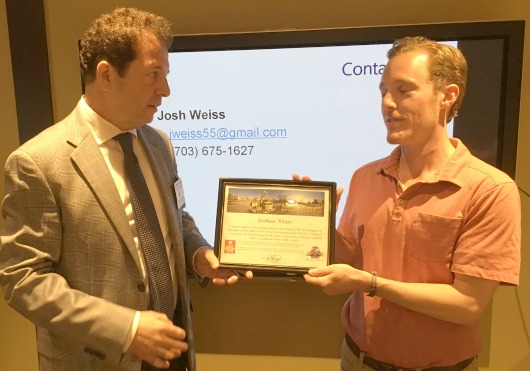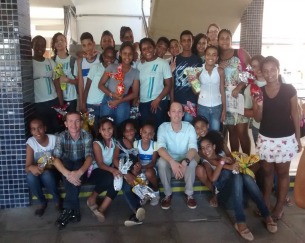Rotary Spoke 06 06 16
Posted by Lori Moresco on Jun 06, 2016
On a warm, sunny, beautiful Monday, 18 Rotarians, 1 guest, and 1 speaker gathered for a lunch of chicken and rice, salad and cold cuts, and, of course, cookies.
The pledge was led by Steve K. PS@A Charlie V started us off on one verse of America. PDG Jack gave the invocation. PP David S led the welcome song with all Rotarians standing.
Raffle gifts were donated by Arlex Oil, Franklin Street Capital, Lexington Colonial Times, and Bickling Financial.
Steve K donated happy dollars for his trip to Berlin and Amsterdam with his wife, and also for PP Don M’s drone demo, which Steve won as a raffle prize. PP Dave S gave 5 dollars for attending his last board meeting after many years. PP Frank S. gave 20 happy dollars because he brought his daughter home from Dartmouth for the summer. Megan M. donated for her trip to New York with her mother to see her brother whose ship was docked there. Another brother joined this wonderful reunion. PP John O’D donated 50 happy dollars because his son was inducted in to the Middlesex Prep. School Athletic Hall of Fame. Congratulations for getting in so soon! PP Don M donated for our good singing but mentioned something about forgetting the bulletin. PP Bob S paid for his ringing phone? PP Murry A paid for celebrating his 75th birthday.
One outstanding member of the club received a Paul Harris Fellow making 8+1. VP Lori M also received one.
- Pres. Dominic reminded us of the District Red Sox game on July 8th against Tampa. Tickets are 65 dollars. Seats are in right field grandstand.
- On June 10th Rotary Means Business is meeting with David Gardner at Strega Prime in Woburn.
- Pres. Dominic also thanked those Rotarians who represented the club at LHS Sports Night.
- The presidential induction of Pres. Elect Susan is June 27th. Please attend this special event.
PP Murry introduced the speaker Josh Weiss. He grew up in Virginia, taught English for 7 years in the US and abroad. He attended Emory College, received a Masters degree from the University of Alabama, and is currently pursuing higher education at Harvard University. He is studying digital media design. His topic was “Empowering Disadvantaged Learners through Auto-Didactic Resources”. Josh has created a project that will provide a connection for students to use resources for educational enrichment. It was through Josh’s work in Salvador, Brazil (where he lived for 4 years), that he realized that students receive no instruction as to how to find resources, nor do the students understand how to use the websites for educational enrichment. Students in Salvador understand that fluency in English is an important qualification for desirable employment. There currently exists language based resources, but students need to be empowered with the knowledge of these tools (APPS). Josh plans to “transfer the subject specific expertise into optimally meaningful and effective learning experiences” for the Salvador students. Josh has worked hard to develop objectives, a program design and an output plan. Josh wants to build an APP with technology to aid and enhance learning.
PP Murry won the 50/50 with ticket 157 for 40 dollars.
VP Lori Moresco
Empowering Disadvantaged Students through Auto-Educational Resources
Abstract
Traditionally, education has taken the form of in-person transferal of information. However, with the widespread availability of personal media consumption devices (i.e. smartphones, tablets, computers), this paradigm has shifted dramatically. Auto-education via the internet has become a viable mode of conveyance, allowing anyone, anywhere to learn languages, technical skills, and even musical instruments without any in-person instruction. Emerging online information repositories such as Coursera, Khan Academy, and MIT OpenCourseWare offer high-quality instruction and application opportunities for educational enrichment, requiring only ambition and an internet connection.
However, it has become apparent in my work with the Allan Kardec School in Salvador, Brazil over the past few years that many disadvantaged communities are not aware of these resources for educational enrichment. Furthermore, students in these communities frequently receive no instruction as to the availability of these resources; nor are they trained in how to go about utilizing online resources for educational enrichment. Indeed, 80% of students surveyed had access to the internet at home, but only 7% could name a website for further independent study. It stands to reason that there is a marked disconnect between resource and student.
The aim of this project is to provide that connection. This would occur through alignment of curriculum to resource, creation and dissemination of paper- and online-based access guides, and an in-person training session regarding how to utilize the access guides.
The subject focus will be English-language instruction. The reason for this subject matter is three-fold:
Student investment: Given Salvador’s booming tourism sector, English acquisition is an area in which students are highly motivated. Fluency in English is an important qualification for desirable employment in the tourism and hospitality industries, and would therefore signify upward mobility for many in these communities. (Allan Kardec students have already demonstrated significant commitment to after-hours, non-credit English programs at the Pan American School of Bahia, the motivation for which is linguistic ambition.)
Breadth of resources: There currently exists a broad range of high-quality, interactive, and engaging online Portuguese-to-English and English as an Additional Language (EAL) resources. Energy need not be spent on creating resources, and instead can be channeled into curricular alignment and dissemination/ empowerment.
Expertise: The Program Director (Joshua Weiss) possesses 7 years of experience in curricular design and online resource management in English-language instruction with primarily EAL populations. The Program Director can transfer this subject-specific expertise into optimally meaningful and effective learning experiences for the students in question.
Need statement
The Rotary Club (Boston-area) is petitioned for financial support. The support is requested in the form of a district and/or global grant in conjunction with the Rotary Club of Itapagipe (Salvador, Brazil). This funding would offset operational costs such as webhosting fees, printed materials, and travel. This funding would also offset living costs while traveling to, and residing in and around, Salvador.
In addition, Rotary members (Boston-area) would be warmly welcomed to take part in research, code development, and training per the scope of the project. Much of this participation can be accomplished remotely. However, this is not a requirement, nor is it necessary for the implementation of the project.
Objectives
- Align online English-language resources (software, apps, forums, movies, songs, instructional games, etc.) to current English instruction.
- Generate paper- and online-based access guides with instructional framework bridging classroom lessons and media resources.
- Train students and instructors in how to use and leverage access guides.
Program Design
1) Observe English-language curriculum at pilot schools in Salvador, Brazil
2) Record English-language curriculum (lesson-by-lesson) occurring in pilot schools
3) Research online and media resources that apply concepts learned in class
4) Align online and media resources to concepts learned in class
5) Develop instructional framework that bridges classroom concepts and online resources
6) Generate paper- and online-based access guides
7) Distribute paper-based access guides to pilot school students and instructors; conduct in-person training session regarding how to utilize access guides
8) Disseminate access guides to additional public schools (non-pilot); conduct in-person training sessions regarding how to utilize access guides
9) Conduct end-of-semester survey evaluating focus, relevance, and clarity of access guides
10) Formulate next steps regarding additional resources, improved alignment, and clearer instructional framework
Output
- Alignment scheme (curriculum-to-resource)
- Student-ready paper- and online-based access guide
- Survey that evaluates focus, relevance, and clarity of access guides
- Reflection for next steps
Roles
- Rotary Club of Itapagipe (Salvador, Brazil) Grant (housing, living costs, transportation, media costs), Inquiry into other schools in Brazil desiring access guide and training session
- Rotary Club (Boston-area), Grant/partnership with Rotary Club of Itapagipe (housing, living costs, transportation, media costs)
- Rotary School of Itapua (Salvador, Brazil), Observation and interview site, Live site for user testing
- Allan Kardec School (Salvador, Brazil), Observation and interview site, Live site for user testing
- Pan American School of Bahia (Bianca Begrow), Liaison with Allan Kardec director (Lolita), Joshua Weiss (Program Director), Conduct observations and research at pilot schools produce outputs (see above), communicate progress to Rotary clubs and schools, facilitate communication among parties in USA and Brazil.
Timeline
- 12/2015 – 6/2016:
- Curriculum-to-resource alignment scheme
- User experience interviews
- Information architecture
- Web app protype user testing
- 7/2016 – 12/2016:
- Developing web app code
- Alpha testing (internal)
- User experience testing
- 1/2017 – 5/2017:
- Developing web app code
- Beta testing (public)
- Formulating training sessions
- 6/2017 - ?
- “Go live” for web app
- On-site training sessions
- Survey and reflection for next steps
Budget
Travel to Salvador, Brazil
- Flight (Boston-Salvador): $1,000-$1,500
- Hotel: $750-1,000
- Cost of living: $1,000-1,500
Technology/media
- Webhosting: $100
- Software and media: $500
Total: USD $3,350-4,600 (depending on currency rates)
.jpg)


